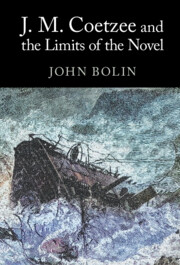Refine search
Actions for selected content:
4 results
Chapter 4 - “Under the shadow of the Monument”: On First Looking into Finnegans Wake
- from Part I - Transnational Genealogies
-
-
- Book:
- Transnationalism in Irish Literature and Culture
- Published online:
- 13 November 2024
- Print publication:
- 14 November 2024, pp 82-98
-
- Chapter
- Export citation
Introduction
-
- Book:
- J. M. Coetzee and the Limits of the Novel
- Published online:
- 08 June 2023
- Print publication:
- 22 June 2023, pp 1-14
-
- Chapter
- Export citation

J. M. Coetzee and the Limits of the Novel
-
- Published online:
- 08 June 2023
- Print publication:
- 22 June 2023
Chapter 18 - War and Capitalism
- from Part III - Emerging Concepts
-
-
- Book:
- War and Literary Studies
- Published online:
- 15 January 2023
- Print publication:
- 05 January 2023, pp 293-306
-
- Chapter
- Export citation
